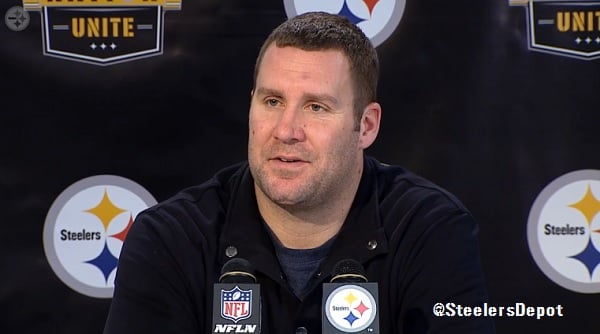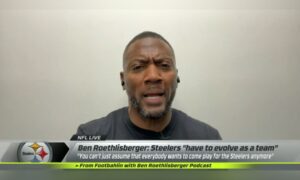Even though Pittsburgh Steelers quarterback Ben Roethlisberger finished the year putting together what is arguably the best season of his career, statistically, there was nevertheless a pervading sensation that the veteran had quite obvious ebbs and flows in his performance throughout the course of the regular season.
If you look back at the Steelers’ schedule, there is a pretty significant general correlation between the games in which the team lost and the games in which Roethlisberger struggled, though it’s not a perfect science.
One thing that Roethlisberger has been consistent with all year, however, has been serving his role as leader of the team, especially in defeat, which has perhaps been an issue here and there throughout his career.
Not so in 2014 as the aging veteran continually marshals together a younger and younger group of players around him. Outside of tight end Heath Miller, all of his primary skill position players are not out of their mid-20s, and that includes two All-Pros.
His offensive line, of course, is also a young group, with all of them below the age of 30, most of them substantially so. The offense is, in fact, stacked with young talent, and that is why Roethlisberger has embraced the leadership role more than ever.
For much of his career, he was never put in a position to have to be that leader. The Steelers were a team driven by defensive prowess, and that defense was filled with experienced and respected veteran players who policed their own locker room. Roethlisberger was just the guy who threw the ball when the defenders were on the sidelines.
That isn’t the case anymore. Maybe he’s not the sole face of the franchise—as mentioned, he has two high profile All-Pro teammates on the offensive side of the ball alone—but he is no doubt the voice of the Steelers, and when he speaks to the media these days, he speaks with an awareness of that very fact.
He is the ambassador, and he conveys messages not only to the media, but to his teammates as well, humbly giving all the credit away while asking for all of the blame. This was perfectly exemplified in the aftermath of Pittsburgh’s Wildcard loss on Sunday night.
When asked about the unfortunate Terrell Suggs interception midway through the fourth quarter in a one-possession game that was the turning point in the contest, Roethlisberger placed the blame on himself for not delivering a better ball, and for not understanding that Ben Tate wasn’t used to playing with him and knowing how he would throw the ball in that situation.
Never mind the fact it was Tate missing his block in pass protection to begin with that put Roethlisberger under pressure and forced him to check the ball down to his newly signed running back. No, it was simply Roethlisberger not making the throw easy enough for him. That’s what a leader does, and that’s who Roethlisberger has become, which bodes well for the future.








